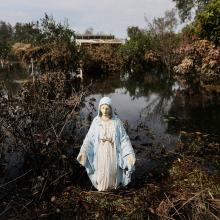Gulf Coast
NEW ORLEANS — Faith-based ministries and local charities that are ramping up relief efforts after Hurricane Isaac say it's already clear that recovery will proceed without the national outpouring of money and volunteers triggered by Hurricane Katrina.
"From our point of view, the biggest challenge with this disaster will be getting attention and money," said Gordon Wadge, president of the New Orleans chapter of Catholic Charities.
"This is going to be on the local community — with a few national folks who follow us closely and who will rally to us."
That's a stark contrast to the conditions relief directors saw in 2005, after nationally televised images of human misery from Katrina burned themselves into the national psyche. Within weeks, faith-based ministries and secular relief groups promised to funnel millions of dollars into New Orleans over five years.
From The Guardian:
The Gulf of Mexico oil spill continues to plague BP more than two years after the disaster as the company has revealed another $847m (£538m) hit to cover rising legal costs.
The additional charge for the second quarter brings the total bill for the fatal Deepwater Horizon incident to $38bn, BP said.
BP is struggling to shake off the reputational blow of the April 2010 Macondo blow-out after recently coming under further fire in a report from a US government safety panel.
Learn more here
Rest and renewal are hard to come by for any leader.
As such, there’s a week that I treasure each year for providing me with the deep replenishment I need to keep me going as I lead international creation care ministries. It may not be everyone’s idea of a good time, but for me it’s a balm that picks me up like no other—Duke Divinity School’s annual summer institute hosted by the Center for Reconciliation.
The first time I attended the institute in 2010, I limped in like a spent marathon runner crossing the finish line. After successfully rising to the challenges of the recently ended academic year, I was bone weary from the demands of leadership and ready for a week of recuperation and rejuvenation.
I was looking forward to being with like-minded leaders who implicitly understand my mission to educate Christian university students to “be agents of, and participants in, God’s shalom,” soaking in the wisdom from long time heroes like John Perkins, and participating in my selected creation care track led by Duke Divinity’s Norman Wirzba.
In huge news last week that was largely overwhelmed by the Supreme Court ruling on health care, Washington came together to direct the Clean Water Act fines from BP's oil drilling disaster of 2010 to fund Gulf coast restoration and recovery.
Attached to the transportation bill that President Obama signed on July 6 was a provision called the RESTORE (Resources and Ecosystems Sustainability, Tourism Opportunities and Revived Economies) the Gulf Coast Act, which will send 80 percent of BP's eventual fines (likely somewhere between $4-$20 billion) to the five Gulf states and set up an ecosystem restoration council with joint state and federal leadership.
Faith communities should cheer this news for a couple of reasons. First, they asked for it. The legislation has been supported by many different faith-led efforts, such as a letter signed by over 140 religious leaders from Sojourners own Jim Wallis, Mitch Hescox of the Evangelical Environmental Network, and many clergy from around the nation. Local Gulf faith leaders spoke up as well, with the Louisiana Interchurch Conference passing a resolution calling on their member groups to support and lead efforts for Gulf recovery and the RESTORE Act.
Two years after the devastating Deepwater Horizon oil spill ravaged the Gulf of Mexico, federal officials today filed the first criminal charges in connection with the incident, The Huffington Post reports:
Kurt Mix, 50, a senior BP drilling engineer, allegedly destroyed hundreds of text messages sent to a supervisor that described high volumes of oil flowing from the ruptured well, located 5,000 feet underwater, according to a federal affidavit …
Mix is reportedly the first person who would actually be charged since the disaster occurred.
In its report of the arrest, The Associated Press noted that:
Kurt Mix, of Katy, Texas, was arrested on two counts of obstruction of justice.
The BP-leased rig Deepwater Horizon exploded the night of April 20, 2010, killing 11 workers and setting off the nation's worst offshore oil disaster. More than 200 million gallons of crude oil flowed out of the well off the Louisiana coast before it was capped.
At the time of the oil spill, Sojourners CEO Jim Wallis visited the Gulf Coast to view the devastation and spoke strongly, placing the culpability for the disaster in the hands of “human folly, human sinfulness and human greed.”
Jack Palmer is a communications assistant at Sojourners. Follow Jack on Twitter @JackPalmer88.
One year after the Deepwater Horizon Oil Spill, life has not returned to normal in the Gulf.
It is hard to imagine that it's been six months since the BP oil spill in the Gulf of Mexico.
The BP catastrophe invites us to take a hard look at ourselves. We invited eight writers to offer their reflections on images from the Gulf Coast disaster.
Editor's note: "Voices From the Gulf" is a series of posts from people experiencing first-hand the devastating effects of the worst oil spill in American history. Check back often for more stories each week.
Watch the video below of CNN's coverage of Jim Wallis and other faith leaders as they tour the Gulf Coast on a trip sponsored by the Sierra Club. (For live updates, follow @jimwallis on Twitter.)
The captain was the first to smell it. He told us that the ocean didn't used to smell this way. Then, we all smelled it.



